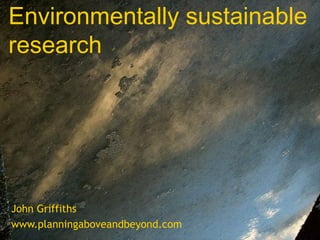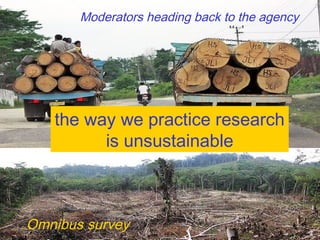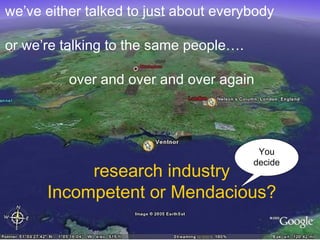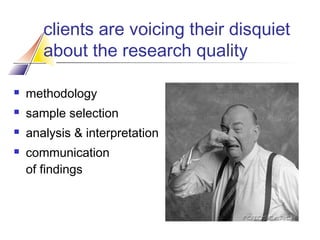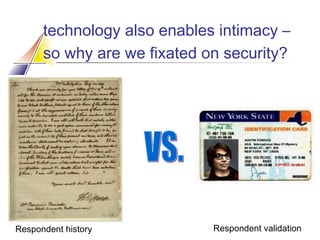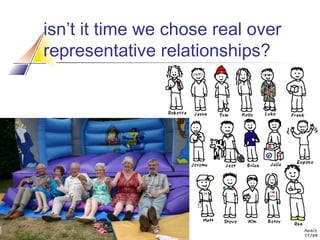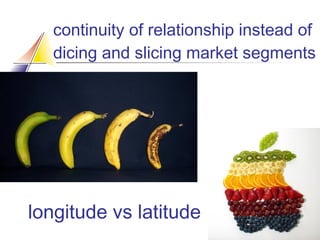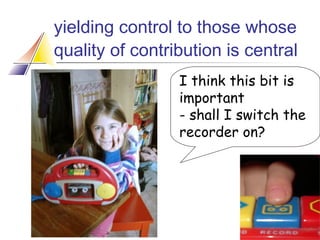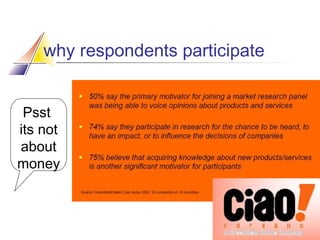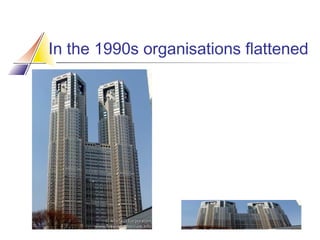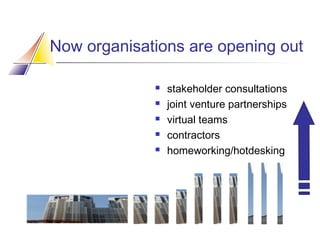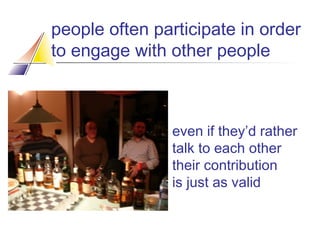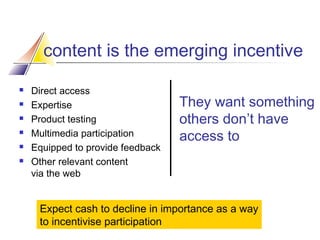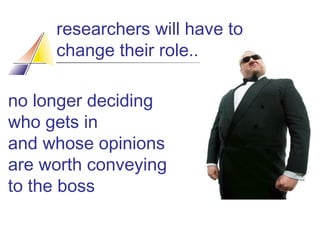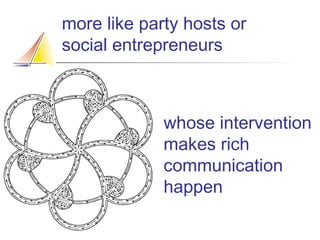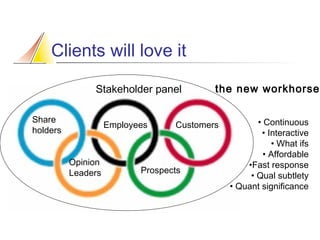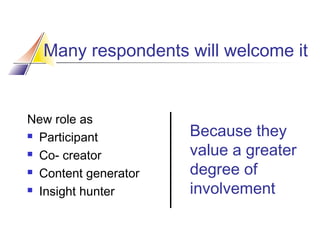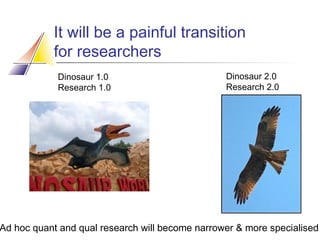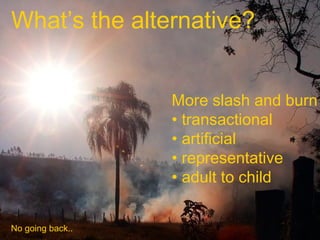Environmentally sustainable research
- 2. Moderators heading back to the agency the way we practice research is unsustainable Omnibus survey
- 3. weŌĆÖve either talked to just about everybody or weŌĆÖre talking to the same peopleŌĆ”. over and over and over again You decide research industry Incompetent or Mendacious?
- 4. clients are voicing their disquiet about the research quality ’ü« methodology ’ü« sample selection ’ü« analysis & interpretation ’ü« communication of findings
- 5. technology also enables intimacy ŌĆō so why are we fixated on security? Respondent history Respondent validation
- 6. isnŌĆÖt it time we chose real over representative relationships?
- 7. continuity of relationship instead of dicing and slicing market segments longitude vs latitude
- 8. yielding control to those whose quality of contribution is central I think this bit is important - shall I switch the recorder on?
- 9. why respondents participate Psst its not about money
- 10. In the 1990s organisations flattened
- 11. Now organisations are opening out ’ü« ’ü« ’ü« ’ü« ’ü« stakeholder consultations joint venture partnerships virtual teams contractors homeworking/hotdesking
- 12. IŌĆÖll answer your questionsŌĆ” If youŌĆÖll answer my questions in return
- 13. people often participate in order to engage with other people even if theyŌĆÖd rather talk to each other their contribution is just as valid
- 14. content is the emerging incentive ’ü« ’ü« ’ü« ’ü« ’ü« ’ü« Direct access Expertise Product testing Multimedia participation Equipped to provide feedback Other relevant content via the web They want something others donŌĆÖt have access to Expect cash to decline in importance as a way to incentivise participation
- 15. researchers will have to change their role.. no longer deciding who gets in and whose opinions are worth conveying to the boss
- 16. more like party hosts or social entrepreneurs whose intervention makes rich communication happen
- 17. Clients will love it Stakeholder panel Share holders Employees Opinion Leaders the new workhorse Customers Prospects ŌĆó Continuous ŌĆó Interactive ŌĆó What ifs ŌĆó Affordable ŌĆóFast response ŌĆó Qual subtlety ŌĆó Quant significance
- 18. Many respondents will welcome it New role as ’ü« Participant ’ü« Co- creator ’ü« Content generator ’ü« Insight hunter Because they value a greater degree of involvement
- 19. It will be a painful transition for researchers Dinosaur 1.0 Research 1.0 Dinosaur 2.0 Research 2.0 Ad hoc quant and qual research will become narrower & more specialised
- 20. WhatŌĆÖs the alternative? More slash and burn ŌĆó transactional ŌĆó artificial ŌĆó representative ŌĆó adult to child No going back..
Editor's Notes
- #2: This talk is about whatŌĆÖs wrong with market research which prides itself on being environmentally unsustainable Recruiting large numbers of respondents and throwing them away afterwards In this paper I want to outline why sustainable research will actually produce better findings than we do now. It should make research more accessible to clients than todayŌĆÖs start stop projects
- #3: The way we practice research is unsustainable. Its astounding how wasteful both qualitative and quantitative research is ŌĆō we may value longstanding client and supplier relationships but where it comes to research we dispose of the respondents within minutes after extracting a fraction of the experience they offer. Blind to the reality that respondents like everything else on this planet are a finite resource. Who has calculate the wear and tear on customer behaviour of rejecting respondents, of people resorting to fraud to try to be selected ŌĆō or of the effect on consumer behaviour ŌĆō first they want you ŌĆ” then if you say the wrong thing theyŌĆÖll disqualify you
- #4: There is an ongoing debate about how extensive fraud is. After that last half century of research in the UK, either a significant proportion of the population can be considered damaged goods ŌĆō they have been researched at least once ŌĆō there arenŌĆÖt enough people to go round. Which makes us rather incompetent. Or weŌĆÖre researching the same remnant over and over again. And we pretend theyŌĆÖre brand new when theyŌĆÖre not ŌĆō which makes us liars then. You decide.
- #5: Clients have become quite vocal about research quality. About the methods weŌĆÖre using, why theyŌĆÖre being charged so much for more of the same ŌĆō the same faces turning up in research groups, the quick turnarounds and the usefulness of the findings.
- #6: WhatŌĆÖs bizarre is that technology has made it easy to keep tabs on respondents so slash and burn really makes no sense. Actually Internet and database culture makes it possible to sustain relationships building up histories and increasing our knowledge of those we reachŌĆō why do we presume that respondents are fraudulent and need to be monitored ŌĆō why not capture their experience and recruit for continuity and enrichment?
- #7: IsnŌĆÖt it time to get real about respondent contamination? Surely we can make allowances for the increasing research experience of someone who has been serially interviewed? The real issue that we only value their contribution insofar as it represents not the individual but a whole group of people. IsnŌĆÖt it time we chose real relationships pver representative ones?
- #8: Longitudinal research works on the basis of continuity ŌĆō quality of relationship is privileged over having dozens of different types of horizontal relationship each of which have to be monitored separately and comparisons made purely by content. With longitudinal research the respondent is much more aware of research as a process and can reflect on it. Respondents can change their minds and say so.
- #9: ThereŌĆÖs a political issue here. We have to give up control. In a recent conversation Claire Goodman Professor of Healthcare Research was describing to me how she was giving control of the tape recording to children. Peer group reviews and ethical committees supplemented by presenting back to respondents ŌĆō are better than no accountability or feedback at all
- #10: Why do respondents participate? Well some of the reasons theyŌĆÖve given me in the past year are the following Because they find research interesting and validating ŌĆō Because theyŌĆÖre interested in the product area Because they admire the brand. Because itŌĆÖs like a job Because meeting other respondents affirms them socially Because itŌĆÖs a great way to meet people with the same interests or who understand them ŌĆō terminal patients can often prefer to band together - The Ciao research suggests that money is really not one of the main motivators for people joining their panels. These are all reasons which respondents have given me in the last year about why they are participating ŌĆō all of which I ignore because all that matters is that IŌĆÖve paid them. Only of course its not a payment otherwise the Inland revenue would get involved. So if respondents are not our employees does this mean that we have obligations to them?
- #11: Not only does the technology make continuity of relationship with respondents possible ŌĆō it has raged through our businesses flattening them as it has gone through.Now large enterprises manage with a fraction of the vertical layers.
- #12: Charles Handy predicted the redistribution of employees in and outside work premises but the real culture change is when companies start to open themselves up to involving stakeholder groups who arenŌĆÖt employees. But the democratising of technology has made it possible for unprecedented levels of participation from those who buy and use the products. This isnŌĆÖt necessarily CRM. Customers donŌĆÖt want a relationship with any old company who has a CRM program ŌĆō but they may choose to have some form of connection ŌĆō but they will expect to play an active and sometimes critical role.
- #13: The Nature of the interactions with different stakeholder groups will be very different. It will be a relationship between equals. TheyŌĆÖll answer our questions but weŌĆÖll have to start to answer theirs.
- #14: Part of the attraction of their involvement will be because they can interact with other stakeholder groups and it will be the job of the company to make this easier and not to try to control it.
- #15: A consequence is that content is going to become a lot less dependent on paying people to respond. In fact the insider content is going to be the big draw. You donŌĆÖt keep people interested for months on end with money only. The reward for involvement must be continual access and exposure to privileged information - not waiting to be asked questions ŌĆō respondent is being given things to do.
- #16: Researchers arenŌĆÖt going to like this ŌĆō it was easy fixing a price going to ask the questions and decided who to allow in and which bits to report back to HQ
- #17: The emerging role will be favour those researchers who function as party hosts or social entrepreneurs. Creating value to the client through the imaginativeness with which they construct and sustain rich communication running in different directions.
- #18: We are talking about stakeholder panels here. Conducted mostly online. Clients are going to love this. Continual access , Interactivity Ability to hypothesise and check what ifs Fast response And for perhaps the first time to be able to afford to combine qualitative subtlety with the security of big numbers
- #19: I donŌĆÖt believe it will be a problem filling these panels. Because enough people will want to get involved because they value a greater degree of involvement. They are being treated like participants and equals and no longer as disposable respondents.
- #20: The transition isnŌĆÖt going to be easy for those researchers conducting adhoc projects. Because the business model is changing. Ad hoc qualitative and quantitative research is set to become narrower and more specialised as huge swathes of research projects are swallowed up inside the emerging client stakeholder panels.
- #21: There isnŌĆÖt time to argue both sides of this. But I close with the question is there really an alternative? The current model is unsustainable. Do we really want to persist with slash and burn Continuing with artificial representative adult to child transations when a richer alternative beckons? I put it to you that its time we put in some changes from the ground up. ŌĆōthe customer is getting smarter ŌĆō most of the smartness is being discarded by our current interviewing methods. the question is really how long the current model is going to be sustainable ŌĆō do we want to move from artifically anonymous discrete relationships recruited face to face to artificially anonymous discrete relationships on line ŌĆō we need continuity and quality of relationship

